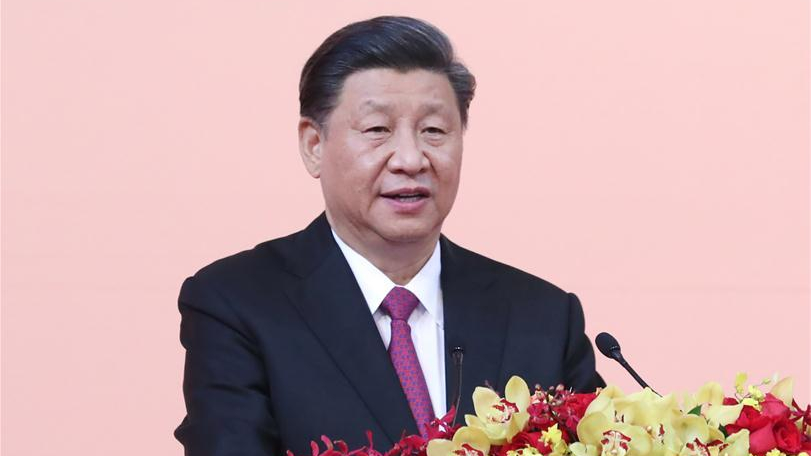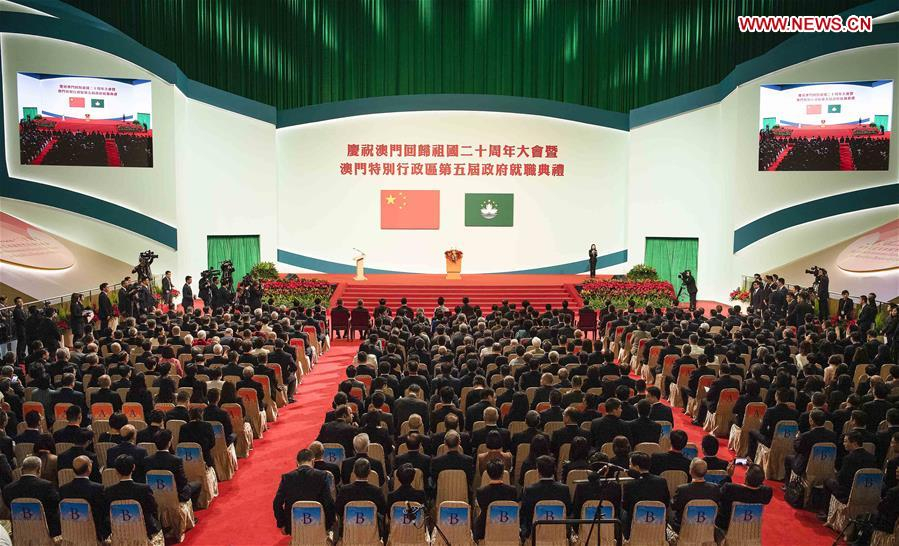
Chinese President Xi Jinping delivers a speech at a welcome banquet marking the 20th anniversary of Macao's return to the motherland in south China's Macao SAR, December 19, 2019. /Xinhua Photo
Chinese President Xi Jinping delivers a speech at a welcome banquet marking the 20th anniversary of Macao's return to the motherland in south China's Macao SAR, December 19, 2019. /Xinhua Photo
Editor's note: Tom Fowdy graduated from Oxford University's China Studies Program and majored in politics at Durham University. He writes about international relations focusing on China and the Democratic People's Republic of Korea. The article reflects the author's opinions and not necessarily the views of CGTN.
On Friday morning Chinese President Xi Jingping commemorated 20 years since Macao's return to China. In delivering a signature speech, Xi praised city's success in having "firmly established a constitutional order based on the Constitution and the Basic Law" and the confidence as to which locals have placed in the 'One Country, Two Systems' model.
He further pledged to safeguard China's national sovereignty, vowing to combat external interference, which has perpetuated unrest in its neighboring city. This coincided with an address he gave the previous evening calling for the practice of "One Country, Two Systems" with "Macao Characteristics" can be a recipe for continued success in the city, praising their "core value of loving the motherland and Macao." He proceeded to praise the city for having implemented Article 23 of the Basic Law, a national anthem law and setting up a national security commission.
What is the significance of Xi's speech here? Xi is alluding to what it means for a One Country, Two Systems model to function properly. Whilst Macao as a special administrative region maintains its respective autonomy and unique qualities, it nevertheless chooses a path of cooperation, harmony and unity with the greater whole of China than differentiation and confrontation, a stark contrast to what has been witnessed in neighboring Hong Kong.

A gathering in celebration of the 20th anniversary of Macao's return to the motherland is held in south China's Macao SAR, December. 20, 2019. /Xinhua Photo
A gathering in celebration of the 20th anniversary of Macao's return to the motherland is held in south China's Macao SAR, December. 20, 2019. /Xinhua Photo
Xi is thus highlighting that Macao's success rests in its ability to positively embrace China as it sustains its own aspects. One Country, Two Systems is ultimately about sustaining a pragmatic and workable co-existence under a common identity.
As I stated several days ago, Macao's attitude as a Special Administrative Region is different to Hong Kong in that it does not advocate a sense of local exceptionalism, which mandates an inflated fear and rejection of China. Instead, as a smaller territory, Macao residents have been pragmatic in recognizing that cooperation with the Chinese mainland is in the best interest of the city.
Locals are instead, comfortable with their belonging and even the BBC, relentlessly biased in favor of unrest in Hong Kong, had to admit that political dissent does not actually exist in the city. Embracing the Chinese mainland, Macao has saw its GDP and living standards surge as a consequence.
This helps elaborate the context behind Xi's speech. The Chinese leader is arguing that the success of a One Country, Two Systems model lies in the ability of both parties to embrace each other positively, co-exist and work together under one common identity, than to pursue suspicion, division and confrontation. Whilst Macao maintains its respective autonomy and unique cultural angle, it nevertheless recognizes the country it is a part of, acknowledges Chinese sovereignty and pursues a harmonious approach.
For example, Macao has implemented Article 23 of the Basic Law which stipulates it "shall enact laws on its own to prohibit any act of treason, secession, sedition, subversion." This is a constitutional provision and a component of the 'one country' aspect. Macao has been able to pragmatically implement safeguards against foreign interference without ceding its own autonomy, allowing it to continue to prosper and grow in importance.
In choosing a path of coordinating with China, the city's own autonomy has not been undermined, and Beijing has been able to better embrace what Macao has to offer to China as a whole, without liability and therefore maintain a vested interest in maintaining the status quo.
Therefore, Xi's speech in Macao highlighted how placing confidence in the One Country, Two Systems model is an essential ingredient to upholding its success. Macao maintains its specific autonomy and qualities, but nevertheless cooperates positively and pragmatically with its motherland.
This subsequently ensures stability, success and prosperity accordingly, allowing the status quo is both profitable and sustainable. One Country, Two Systems is not a zero-sum game lopsided towards "keeping China out," it is instead about how two parties under the banner of a common identity, maintain their differences whilst nevertheless configuring a workable and beneficial co-existence.
(If you want to contribute and have specific expertise, please contact us at opinions@cgtn.com.)